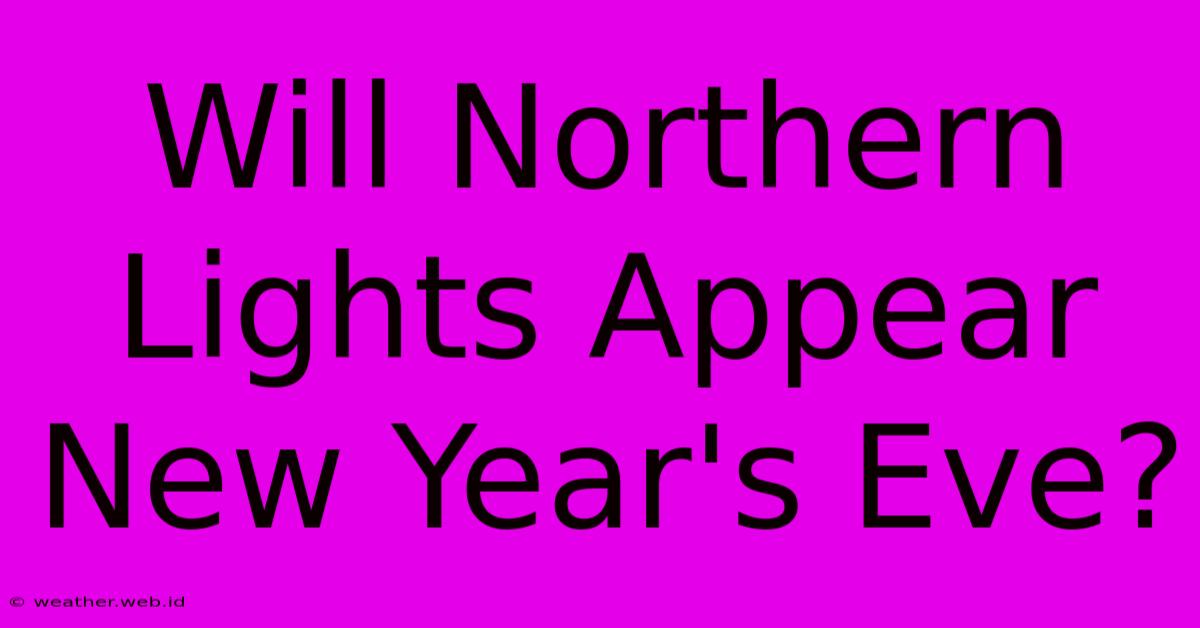Will Northern Lights Appear New Year's Eve?

Discover more detailed and exciting information on our website. Click the link below to start your adventure: Visit Best Website weather.web.id. Don't miss out!
Table of Contents
Will Northern Lights Appear New Year's Eve? A Guide to Predicting Aurora Borealis Sightings
The New Year's Eve sky holds a certain magic, and the possibility of witnessing the ethereal Northern Lights (Aurora Borealis) adds an extra layer of wonder. But will this celestial spectacle grace us with its presence on this special night? The answer, unfortunately, isn't a simple yes or no. Predicting the aurora's appearance requires understanding several factors. This guide will help you assess your chances of seeing the Northern Lights this New Year's Eve.
Understanding the Aurora Borealis
The Northern Lights are a natural light display in the sky, predominantly seen in high-latitude regions. They are caused by charged particles from the sun colliding with atoms in the Earth's atmosphere. The intensity and visibility of the aurora are directly related to solar activity.
Key Factors Influencing Aurora Visibility:
-
Solar Activity: This is the most crucial factor. Increased solar activity, often measured by the Kp index, leads to stronger and more visible auroras. A higher Kp index (typically above 3) generally indicates better chances of seeing the lights. You can find real-time Kp index forecasts from various space weather websites.
-
Geomagnetic Conditions: Even with high solar activity, geomagnetic conditions can affect aurora visibility. Geomagnetic storms can enhance or disrupt the aurora's display.
-
Time of Year: Winter months (December-February) offer longer periods of darkness, significantly increasing your chances of viewing the aurora. New Year's Eve falls perfectly within this prime viewing window.
-
Location: You need to be in a location with minimal light pollution and a clear view of the northern horizon. High-latitude regions like Alaska, Canada, Scandinavia, Iceland, and Greenland offer the best chances.
-
Weather Conditions: Clear skies are essential. Cloud cover will completely obscure the aurora. Checking weather forecasts for your chosen location is vital.
Predicting Northern Lights for New Year's Eve
Predicting the aurora with certainty is impossible, but you can significantly improve your chances by monitoring the following:
-
Space Weather Forecasts: Regularly check reputable space weather websites and apps for Kp index predictions leading up to and during New Year's Eve. These forecasts usually provide a probability of aurora activity.
-
Aurora Forecasting Apps: Many apps provide real-time aurora forecasts based on space weather data and your location. These apps can send you notifications if auroral activity is expected.
-
Cloud Cover Forecasts: Check local weather forecasts meticulously. Even if the Kp index is high, cloud cover will render the aurora invisible.
-
Light Pollution Maps: Find locations with minimal light pollution near you using online light pollution maps. Darker skies offer the best viewing opportunities.
Increasing Your Chances of Seeing the Northern Lights on New Year's Eve
-
Plan Ahead: Research your location carefully. Choose areas known for minimal light pollution and clear northern horizons. Booking accommodations and transportation well in advance is crucial during peak travel times like New Year's Eve.
-
Be Patient: Aurora sightings can be unpredictable. Even with favorable conditions, you might need to wait for the lights to appear. Bring warm clothing, snacks, and drinks to stay comfortable during your wait.
-
Use Aurora-Hunting Tools: Utilize apps and websites designed to track aurora activity.
-
Consider a Guided Tour: Guided tours often take you to optimal viewing locations and provide valuable insight into aurora prediction and photography.
Conclusion: Will the Northern Lights Appear on New Year's Eve?
While we can't guarantee a Northern Lights display on New Year's Eve, by carefully monitoring space weather forecasts, weather conditions, and choosing an appropriate location, you can significantly increase your chances of witnessing this spectacular natural phenomenon. Remember, patience and preparation are key to maximizing your opportunities for a memorable New Year's Eve under the aurora. Happy aurora hunting!

Thank you for visiting our website wich cover about Will Northern Lights Appear New Year's Eve?. We hope the information provided has been useful to you. Feel free to contact us if you have any questions or need further assistance. See you next time and dont miss to bookmark.
Featured Posts
-
Eight Year Divorce Ends Jolie And Pitt Settle
Jan 01, 2025
-
College Football Playoff Updated Schedule
Jan 01, 2025
-
Woman Killed In Nyc Subway Fire Named
Jan 01, 2025
-
Us Northern Lights Forecast Aurora Visible
Jan 01, 2025
-
Where To Watch Lsu Vs Baylor Game
Jan 01, 2025
